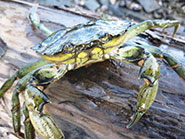In coastal seas around the world noise caused by humans is a dominant feature, with construction and transportation fundamentally modifying ocean soundscapes.
Working with the same common shore crabs that children delight in catching on crablines in UK harbours, the researchers found ecologically-critical effects of ship noise playback on behaviour.
Matt Wale from the University of Bristol said: “Crabs feeding on mussels were often distracted when ship noise was playing compared to quiet harbour recordings. Furthermore, crabs took longer to retreat to shelter after simulated attacks in noisy treatments, and if turned upside-down they flipped back far quicker in noisy conditions rather than turning slowly to avoid attracting the attention of potential predators."
Dr Steve Simpson, Cabot Institute Fellow from the University of Exeter said: “We have already found that ship noise raises the metabolic rate and energetic needs of crabs. If coupled with reduced foraging and worsened responses to predators, this cocktail of impacts may negatively affect growth, fitness, survival and, ultimately, harvested populations and whole ecosystems.”
In the real world these findings present a double-edged sword. Less effective feeding in noisy environments means more time must be spent foraging to avoid starvation, during which crabs are exposed to their natural predators. But if crabs also perform less well when attacked, this elevated predation risk starts to threaten their very survival.
Dr Andy Radford from the University of Bristol: “Ship noise is known to affect whale behaviour, and there is evidence that fish can also be affected by vessel noise. As a result behavioural studies of impact have focused on communication and movement patterns, while implications for marine invertebrates are relatively unknown.”
Paper
'Noise negatively affects foraging and antipredator behaviour in shore crabs' by Matthew A. Wale, Stephen D. Simpson, Andrew N. Radford in Animal Behaviour
Cabot Institute
The Cabot Institute at the University of Bristol carries out fundamental and responsive research on risks and uncertainties in a changing environment. Our interests include natural hazards, food and energy security, resilience and governance, and human impacts on the environment. Our research fuses rigorous statistical and numerical modelling with a deep understanding of interconnected social, environmental and engineered systems – past, present and future. We seek to engage wider society – listening to, exploring with, and challenging our stakeholders to develop a shared response to twenty-first century challenges.
